70th anniversary of ‘Greatest Trials in History’
As the world marks the 70th anniversary of the Nuremberg Trials, SMU recalls the roles four law professors played.
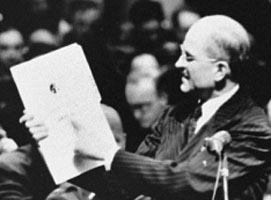
By Denise Gee
SMU News
DALLAS (SMU) – SMU’s unique connections to the Nuremberg Trials – where Nazi leaders were prosecuted for World War II atrocities, setting the foundation for modern international and human rights law – were highlighted at two events commemorating the 70th anniversary of the trials on Monday, Oct. 24.
Expert insight on the legacy of the trials accompanied an exhibit of rare items – including Hitler’s marriage certificate, will and Nuremberg-related documents – from “The Storey Collection” shared by the family of former SMU School of Law Dean Robert G. Storey. After his work as executive trial counsel at Nuremberg, the former U.S. Army colonel focused on making SMU an international law center. Storey’s work ultimately drew three other former Nuremberg prosecutors to join the law faculty: Whitney Harris, Jan Charmatz and Walter Brudno.
“For SMU to have had only one professor involved in the Nuremberg Trials would be a badge of honor. But to have had four? That’s extraordinary,” says SMU Dedman Law Prof. Chris Jenks. An armed forces and humanitarian law expert, Jenks organized the on-campus panel discussion and introduced the Storey Collection at the late-afternoon event.
Storey, Harris, Charmatz and Brudno met while working as prosecutors for what was officially known as the International Military Tribunal, held from November 1945 to October 1946 in Nuremberg, Germany, the Nazi Party’s ceremonial birthplace.
The unprecedented legal proceedings, consisting of one main trial and 12 subsequent trials, resulted in trials of dozens of high-ranking Nazis, including Hermann Goering and Rudolf Hess. The Allied Powers (the United States, Great Britain, France and the Soviet Union) used some 3,000 tons of the Third Reich’s own meticulous documentation to provide what Storey called “unimpeachable evidence” of crimes against peace, the laws of war, and humanity. The Tribunal also revealed much of what is known about the Holocaust: the Nazis’ systematic murder of 6 million Jews and 5 million others based on religion, race, political affiliation or sexual orientation.
“Unless record was made … future generations would not believe how horrible the truth was,” explained the chief prosecutor for the U.S. legal team, Supreme Court Justice Robert H. Jackson.
Added former prosecutor Harris, “For the first time in history, absolute rulers were brought to account before the law. There is no longer any state, or any ruler of any state, who can claim total immunity from the law. … The age of empires has passed. At Nuremberg we put tyranny on trial. It is our duty to keep tyrants forever under the law.”
At the commemoration’s first event, “The Nuremberg Tribunals’ Legacy: SMU’s Role in Seeking Justice, Then & Now” (at SMU Dedman School of Law), experts in international criminal law and human rights discussed the Trials’ significance, its SMU connections and University’s ongoing efforts to promote accountability. Sponsored by SMU Dedman Law, the SMU Veterans Law Association, the SMU Criminal Law Association and the Center for American and International Law, the event featured as guest speakers:
- Lelia Nadya Sadat, Washington University School of Law James Carr Professor of International Criminal Law, director of the Whitney R. Harris World Law Institute and Special Adviser on Crimes Against Humanity to the International Criminal Court.
- Rick Halperin, director of SMU’s Embrey Human Rights Program and faculty member with SMU’s Department of History with a particular expertise in Holocaust studies. He has served three times as board chair for Amnesty International USA.
- Becky Bailey, Dallas County assistant district attorney experienced in humanitarian law. As a SMU Dedman Law student she participated in an externship with the International Criminal Tribunal for the former Yugoslavia at The Hague in Netherlands. She earned her J.D. in 2010 and B.A. from SMU in 2005.
- Jenia Turner (moderator), SMU Dedman Law professor of international criminal law.
The second public event was “The Nuremberg Trials: 70 Years Later” (featuring the Storey Collection) at the Fairmont in Dallas. Distinguished international criminal law experts discussed the Trials’ key aspects in conjunction with the Storey Collection items that once belonged to former Nuremberg prosecutor and SMU Law Dean Storey. Additional items belonging to another former Dallas-based Nuremberg prosecutor, George E Seay, Sr., also were featured.
Sponsored by SMU’s Dedman School of Law and Tower Center for Political Studies, the Center for American and International Law, the Dallas Historical Society and Dallas Holocaust Museum Center for Education and Tolerance, the event’s guest speakers were:
- John Q. Barrett, St. John’s University School of Law professor and Elizabeth S. Lenna Fellow/board member of the Robert H. Jackson Center in Jamestown, New York.
- David Crane, Syracuse University College of Law professor and executive director of the Lender Center for Social Justice and Atrocity Prevention.
- Lelia Nadya Sadat: Washington University School of Law James Carr Professor of International Criminal Law and director of the Whitney R. Harris World Law Institute and Special Adviser on Crimes Against Humanity to the International Criminal Court.
- Lee Cullum (moderator): Host and commentator for KERA.
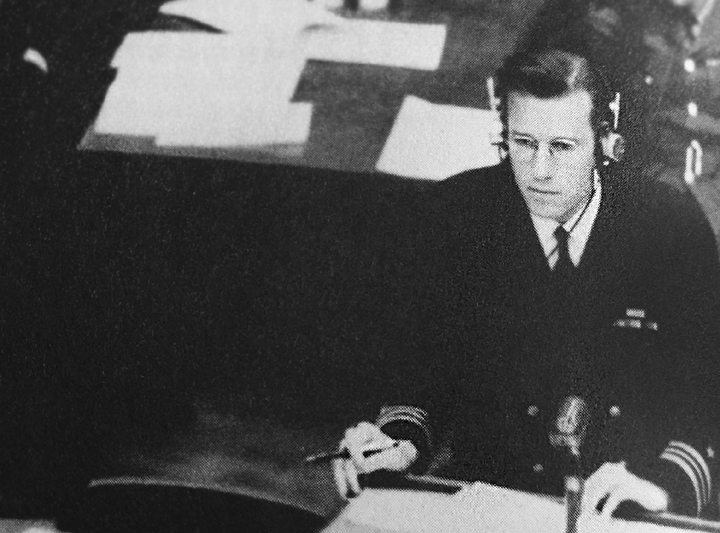 Whitney Harris at Nuremberg. |
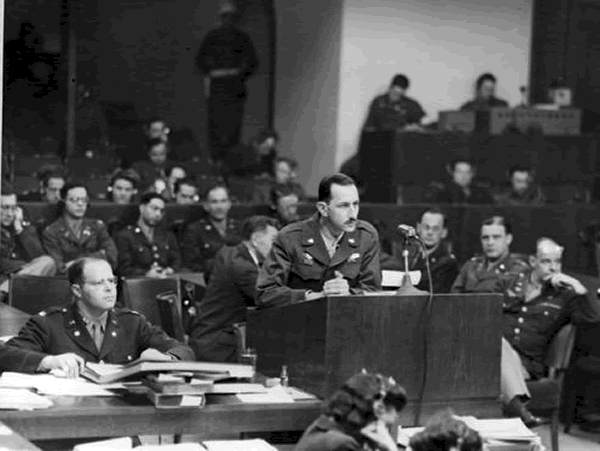 Walter Brudno at Nuremberg. |
|
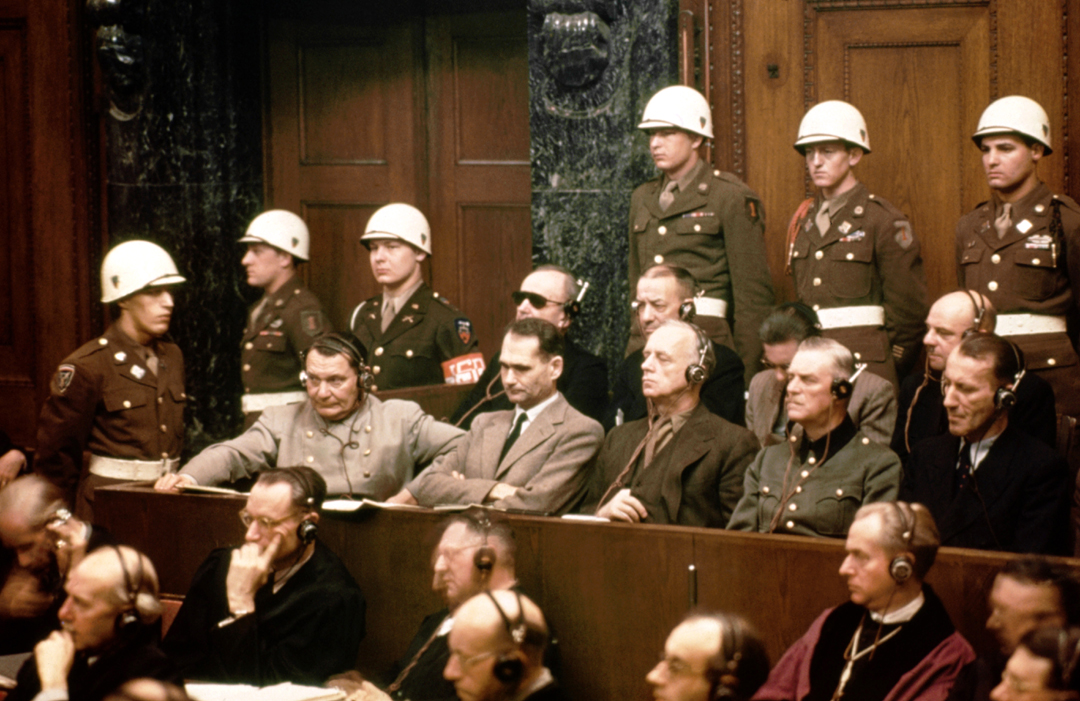 Defendants at Nuremberg. Defendants at Nuremberg. |
||
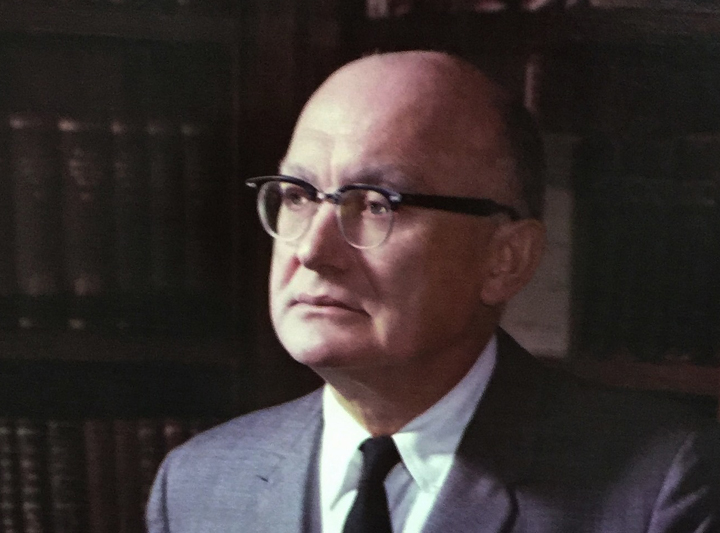 Jan P. Charmatz |
||